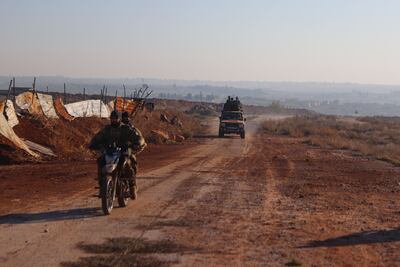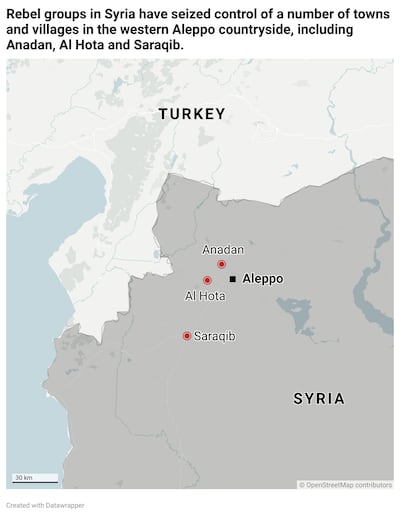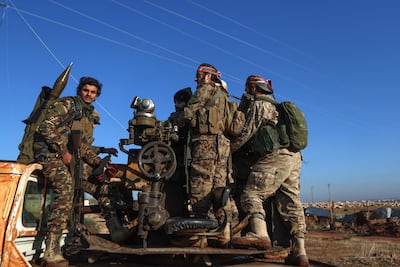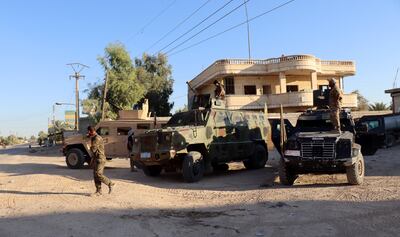Hundreds have been killed in the shock insurgent offensive in northern Syria, in which rebels are said to have captured dozens of villages from government-held areas and reached the outskirts of Aleppo. Army reinforcements have reportedly been sent to the northern city to stem the advance.
There is widespread agreement the attacks represent a serious crisis for Damascus, reeling from lingering conflict, war and economic crisis.
The militant group Hayat Tahrir, formerly linked to Al Qaeda, launched a number of surprise raids this week, using one-way attack drones, tanks and artillery, surging across Aleppo’s countryside to the city’s suburbs. Along with a number of allied groups, they are advancing in a joint Operations Room command structure led by Hayat Tahrir commander Abu Mohammad Al Jowlani.
Lt Col Hassan Abdul Ghani, a commander, told The National the operations called Deter the Aggression were launched with the goal of liberating areas controlled by forces loyal to Syrian President Bashar Al Assad and foreign militia allies.
"The operations were launched with the aim of [...] securing a safe area for the return of displaced people, in addition to securing civilian areas from militia attacks," he said over WhatsApp from Syria.
The operations were launched after a series of attacks on civilians, he said, which came alongside the alleged build-up of Iran-backed militias on fronts in Idlib between Assad-controlled territory and rebel-held areas.
Rebels have captured 45 villages and towns so far, Mr Abdul Ghani said. On its Telegram channel, the operations command on Friday afternoon published footage of what it said were its forces entering Aleppo city, including western districts on the outskirts such as New Aleppo and Al Hamdaniyeh. It was not possible to verify the footage independently.
“We confirm that our operation will continue until its goals are achieved, with God's help, and our civilians are secured," Mr Abdul Ghani told The National.
It is the worst fighting since 2020 in the 13-year-long conflict, which was sometimes described as a “frozen” standoff between rebel forces in Idlib. Anti-government forces there, dominated by militants, have grown in strength and organisation, setting up training camps.

They have faced off with weakened Syrian government forces that want to recapture all of Syria but have been sapped of military strength after years of civil war and economic collapse. Artillery shelling and air strikes in rebel-held areas were still a regular occurrence, along with periodic insurgent attacks.
Opposition sources said an air strike had killed 19 civilians in Aleppo on Friday, while government media said four civilians had been killed in an attack at the University of Aleppo.
Hundreds are thought to have been killed in fighting since Wednesday but the death toll is unknown as the rebels continue their advance.
Iran appears to have rushed military advisers to the are, having lost an Islamic Revolutionary Guard Corps brigadier general in fighting on Thursday. Syrian government forces have spoken of assistance on the ground, possibly from Hezbollah, although the group has been seriously weakened in fighting with Israel.

Several analysts tracking the fighting say the insurgents have cut off the strategically important M5 motorway to Aleppo, as happened in the destructive battle for the city between 2012-2016, which left tens of thousands dead and involved sieges by the regime and the rebels.
Hayat Tahrir and associated militant groups "have been preparing and training for this moment for quite some time", says Daniele Garofalo, an expert on militant groups who writes for various counter-extremism think tanks. "That's all they wanted. They have great training and preparation.”
Some groups in the Syrian National Army, another rebel umbrella group based in north-western Aleppo, appear to be taking part in the fighting. Official social media accounts representing two brigades in the force posted pictures of four soldiers killed in the fighting on Friday afternoon.
Four factors make the latest attacks a crisis for Damascus. The first is that the insurgents are clearly well-equipped with armoured vehicles and drones. As in the post-2011 uprising during which much of the country fell into rebel hands, insurgents appear to have captured vast stockpiles of weapons. According to military expert Alexander Clarkson, Hayat Tahir has built a “far more professional [army] than it had in 2019 or 2016”.

Secondly, regime forces have struggled due to hyperinflation eating into salaries and damaging morale, while a prolonged economic crisis has made it hard for the government to re-equip troops, despite the government supposedly prioritising the military. Analysts say the Syrian army has become fragmented, with disparate political leadership and a number of local militia forces making co-ordinating bigger operations a challenge.
“Much of the Syrian army is still disorganised and instead of building up his forces to prepare them, President Bashar Al Assad became too comfortable behind expecting Iranian and Russian help,” Julian McBride, a geopolitical analyst and former US marine officer, told The National.
Thirdly, in the past the Syrian government relied on massive air power to blunt uprisings, initially their own, starting the 2011 civil war with more than 500 warplanes and hundreds of helicopters, then later formidable Russian support.
But the Syrian aerial force is now heavily degraded and is thought by analysts to number no more than a few dozen aircraft. Russian forces are also heavily committed to the Ukraine war.

Lastly, analysts highlight the involvement of Turkish-backed groups. Turkey has had a mixed relationship with Hayat Tahrir, eventually falling out with the organisation and building its own alliance of rebel groups to hold a buffer zone in northern Syria, pushing Kurdish militias out of Kurdish-majority areas such as Afrin.
Those areas have a small number of Turkish forces and by some estimates, 80,000 Turkish-backed and funded rebels in the Syrian National Army, including a number of groups associated with militancy, such as the Nour Al Din Al Zinki movement.
Aymenn Al Tamimi, an expert on militant groups, has noted some overlap between Ankara-backed forces and the alliance now attacking Aleppo.

Mr Garofalo says: “It is no longer just a question of rebels. The soup of different rebel groups is led by the strong support of HTS [Hayat Tahrir] and numerous jihadist groups allied with it. The running advance is rapid. We are talking about highly trained and highly motivated fighters, no longer those of 2012."
If the insurgent advance continues, it remains to be seen whether the Syrian government will lose far more territory.
“For now I think the situation won’t deteriorate because most core regime soldiers are from the coastal areas or Damascus,” Mr McBride says. There is a strong nationalist motivation for some units, he notes, though he does not rule out a military collapse in some areas in the face of the highly organised insurgents.
